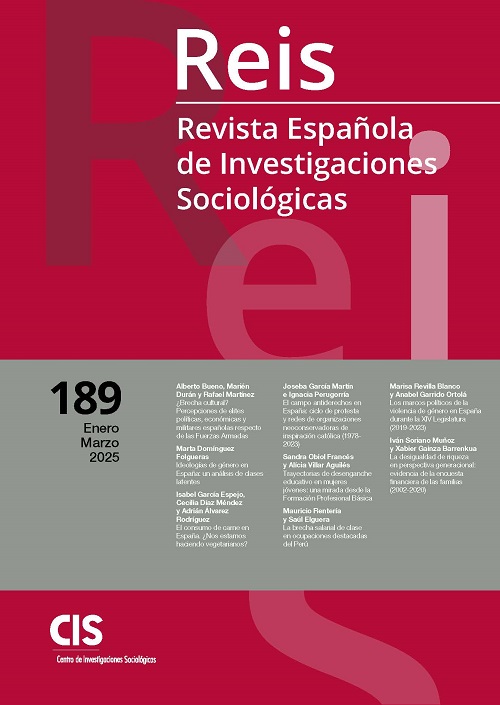Gender Ideologies in Spain: A Latent Class Approach
DOI:
https://doi.org/10.5477/cis/reis.189.23-42Keywords:
Gender Ideology • Values • Latent Class Analysis, Values, Latent Class AnalysisAbstract
Attitudes towards gender equality are often described as either “traditional” or “egalitarian”, depending on support for separate or
joint spheres. Recent research suggests that ideologies are more complex and include multiple dimensions. Using data from the
2018 Fertility Survey, we apply a Latent Class Analysis to study the different dimensions of gender egalitarianism in Spain. We contribute to the literature by considering the role of “family centrality” and by including several indicators that allow us give greater nuance to the interpretation of certain dimensions. The analysis shows that there are five profiles of respondents with different understandings of gender egalitarianism. We also study the sociodemographic characteristics of each of these profiles, showing that sex, age, education, and religiosity are the main variables associated with gender ideology.
Downloads
References
Aristegui Fradua, Iratxe; Beloki Marañón, Usue; Royo Prieto, Raquel y Silvestre Cabrera, Maria (2019). «Cuidado, valores y género: La distribución de roles familiares en el imaginario colectivo de la sociedad española». Inguruak. Revista Vasca de Sociología y Ciencia Política, 65: 90-108. DOI: https://doi.org/10.18543/inguruak-65-2018-art05
Barth, Alice y Trübner, Miriam (2018). «Structural stability, quantitative change: A latent class analysis approach towards gender role attitudes in Germany». Social Science Research, 72: 183-193. DOI: https://doi.org/10.1016/j.ssresearch.2018.02.008
Bolzendahl, Catherine y Myers, Daniel (2004). «Feminist Attitudes and Support for Gender Equality: Opinion Change in Women and Men, 1974-1998». Social Forces, 83: 759-789. DOI: https://doi.org/10.1353/sof.2005.0005
Campbell, Andrea Louise (2012). «Policy Makes Mass Politics». Annual Review of Political Science, 15: 333-351. DOI: https://doi.org/10.1146/annurev-polisci-012610-135202
Campillo, Inés y Armijo, Lorena (2017). «Lifestyle Preferences and Strategies of Spanish Working Mothers: A Matter of Choice? ». South European Society and Politics, 22: 81-99. DOI: https://doi.org/10.1080/13608746.2016.1160528
Cantijoch, Marta y San Martin, Jopsep (2009). «Postmaterialism and Political Participation in Spain». South European Society and Politics, 14: 167-190. DOI: https://doi.org/10.1080/13608740903037901
Charles, Maria y Bradley, Karen (2009). «Indulging Our Gendered Selves? Sex Segregation by Field of Study in 44 Countries». American Journal of Sociology, 114: 924-976. DOI: https://doi.org/10.1086/595942
Cotter, David; Hermsen, Joan y Vanneman, Reeve (2011). «The End of the Gender Revolution? Gender Role Attitudes from 1977 to 2008». American Journal of Sociology, 117: 259-289. DOI: https://doi.org/10.1086/658853
Davis, Sharon y Greenstein, Theodor (2009). «Gender Ideology: Components, Predictors, and Consequences». Annual Review of Sociology, 35: 87-105. DOI: https://doi.org/10.1146/annurev-soc-070308-115920
Dominguez-Folgueras, Marta (2010). «¿Cada vez más igualitarios? Los valores de género de la juventud y su aplicación en la práctica». Revista de Estudios de Juventud, 90: 103-122.
García-Román, Joan (2023). «Does women's educational advantage mean a more egalitarian distribution of gender roles? Evidence from dual-earner couples in Spain». Journal of Family Studies, 29(1): 285-305. DOI: https://doi.org/10.1080/13229400.2021.1915852
Grunow, Daniela; Begall, Katia y Buchler, Sandra (2018). «Gender Ideologies in Europe: A Multidimensional Framework». Journal of Marriage and Family, 80: 42-60. DOI: https://doi.org/10.1111/jomf.12453
Hays, Sharon (1996). The Cultural Contradictions of Motherhood. New Haven: Yale University Press.
INE (2019). Encuesta de Fecundidad y Valores 2018. Metodología. Madrid: Instituto Nacional de Estadística. Disponible en: https://www.ine.es/metodologia/t20/fecundidad2018_meto.pdf
Jakobsson, Niklas y Kotsadam, Andreas (2010). «Do attitudes toward gender equality really differ between Norway and Sweden? ». Journal of European Social Policy, 20(2): 142-159. DOI: https://doi.org/10.1177/0958928709358790
Jurado Guerrero, Teresa (2007). Cambios familiares y trabajo social. Madrid: Ediasa.
Knight, Carly y Brinton, Mary (2017). «One Egalitarianism or Several? Two Decades of Gender-Role Attitude Change in Europe». American Journal of Sociology, 122: 1485-1532. DOI: https://doi.org/10.1086/689814
León, Margarita y Pavolini, Emmanuele (2014). «“Social Investment” or Back to “Familism”: The Impact of the Economic Crisis on Family and Care Policies in Italy and Spain». South European Society and Politics, 19: 353-369. DOI: https://doi.org/10.1080/13608746.2014.948603
Moreno Mínguez, Almudena (2021). «Hacia una sociedad igualitaria: Valores familiares y género en los jóvenes en Alemania, Noruega y España». Revista Internacional de Sociología, 79: e190. DOI: https://doi.org/10.3989/ris.2021.79.3.19.70
Nylund-Gibson, Karen y Choi, Andrew (2018). «Ten frequently asked questions about latent class analysis». Translational Issues in Psychological Science, 4(4): 440-461. DOI: https://doi.org/10.1037/tps0000176
Ridgeway, Cecilia y Correll, Shelley (2004). «Unpacking the Gender System: A Theoretical Perspective on Gender Beliefs and Social Relations». Gender y Society, 18: 510-531. DOI: https://doi.org/10.1177/0891243204265269
Risman, Barbara (2017). Gender as a Social Structure. En: B. Risman, C. Froyum y W. Scarborough (eds.). Handbook of the Sociology of Gender. Cham: Springer. DOI: https://doi.org/10.1007/978-3-319-76333-0
Scarborough, William; Sin, Ray y Risman, Barbara (2019). «Attitudes and the Stalled Gender Revolution: Egalitarianism, Traditionalism, and Ambivalence from 1977 through 2016». Gender y Society, 33(2): 173-200. DOI: https://doi.org/10.1177/0891243218809604
Seiz, Marta; Castro-Martín, Teresa; Cordero-Coma, Julia y Martín-García, Teresa (2022). «La evolución de las normas sociales relativas a las transiciones familiares en España». Revista Española de Sociología, 31(2): 1-28. DOI: https://doi.org/10.22325/fes/res.2022.106
van Damme, Maike y Pavlopoulos, Dimitris (2022). «Gender Ideology in Europe: Plotting Normative Types in a Multidimensional Space». Social Indicators Research, 164: 861-891. DOI: https://doi.org/10.1007/s11205-022-02976-9
Vermunt, Jeroen (2010). «Latent Class Modeling with Covariates: Two Improved Three-Step Approaches». Political Analysis, 18(4): 450-469. DOI: https://doi.org/10.1093/pan/mpq025
Wall, Glenda (2010). «Mothers’ experiences with intensive parenting and brain development discourse». Women’s Studies International Forum, 33: 253-263. DOI: https://doi.org/10.1016/j.wsif.2010.02.019
Weller, Bridget; Bowen, Natasha y Faubert, Sarah (2020). «Latent Class Analysis: A Guide to Best Practice». Journal of Black Psychology, 46(4): 287-311. DOI: https://doi.org/10.1177/0095798420930932
Yu, Wei-hsin y Lee, Pei-lin (2013). «Decomposing Gender Beliefs: Cross-National Differences in Attitudes Toward Maternal Employment and Gender Equality at Home». Sociological Inquiry, 83: 591-621. DOI: https://doi.org/10.1111/soin.12013
Downloads
Published
How to Cite
Issue
Section
License
Copyright (c) 2024 Revista Española de Investigaciones Sociológicas

This work is licensed under a Creative Commons Attribution-ShareAlike 4.0 International License.
Permite Compartir — copiar y redistribuir el material en cualquier medio o formato, Adaptar — remezclar, transformar y construir a partir del material para cualquier propósito, incluso comercialmente.








